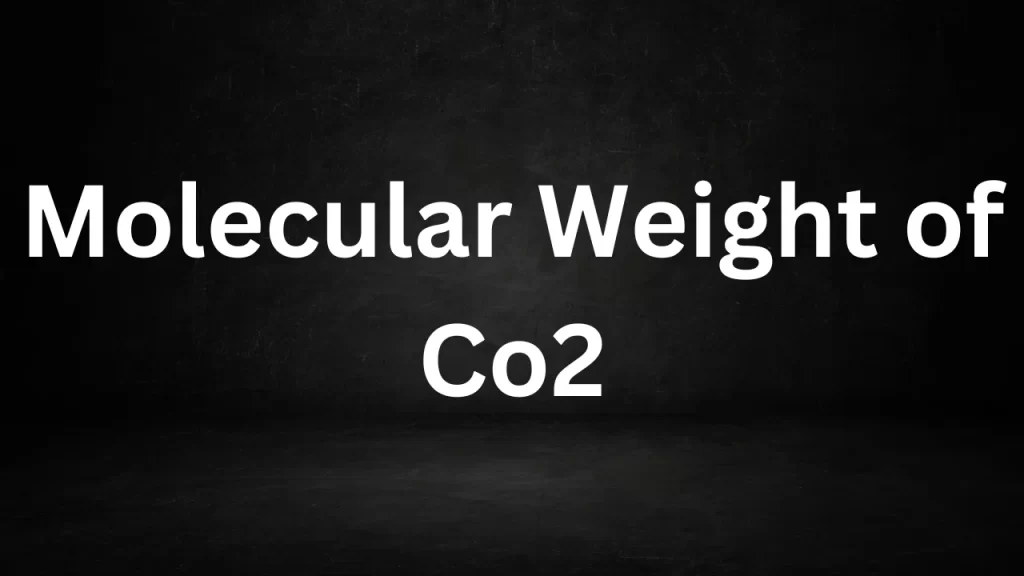Tag: co2 molecular mass
Molecular Weight of Co2
Molecular Weight of Co2: Carbon dioxide (CO2) is a chemical compound that plays a significant role in various natural processes, climate change, and industrial applications.
Understanding its molecular weight is crucial in chemistry, environmental science, and engineering. In this article, we will explore the molecular weight of CO2, its composition, and its relevance in different fields.

mol Weight of Co2
mol Composition of CO2
Carbon dioxide (CO2) is composed of one carbon atom (C) and two oxygen atoms (O), bonded together through covalent bonds. Its chemical formula, CO2, reflects this composition, indicating one carbon atom and two oxygen atoms in a single molecule.
mol Weight of CO2
The mol weight of a substance is calculated by adding the atomic weights of all the atoms in its chemical formula. To determine the mol weight of CO2, we consider the atomic weights of carbon (C) and oxygen (O):
- The atomic weight of carbon (C) is approximately 12 atomic mass units (amu).
- The atomic weight of oxygen (O) is approximately 16 amu.
Now, let’s calculate the mol weight of CO2:
mol Weight of CO2 = (Atomic Weight of C) + 2 × (Atomic Weight of O) mol Weight of CO2 = 12 amu + 2 × 16 amu Molecular Weight of CO2 = 12 amu + 32 amu Molecular Weight of CO2 = 44 amu
Therefore, the mol weight of carbon dioxide (CO2) is 44 atomic mass units (amu).
Significance of the mol Weight of CO2
The mol weight of CO2 holds significant importance across various scientific disciplines:
1. Chemistry:
In chemistry, the mol weight of CO2 is essential for stoichiometry, which involves the calculation of reactant and product quantities in chemical reactions. It helps determine the balanced chemical equations and the molar relationships between substances in a reaction.
2. Environmental Science:
Understanding the mol weight of CO2 is vital in environmental science and climate change research. CO2 is a greenhouse gas, and its molecular weight influences its behavior in the atmosphere, including its role in trapping heat and contributing to global warming.
3. Industry and Engineering:
In industrial processes, the molecular weight of CO2 is relevant for designing equipment, such as compressors and separators, used in the extraction, storage, and transport of carbon dioxide. It is also crucial in carbon capture and storage (CCS) technologies.
4. Health and Safety:
In safety assessments and industrial hygiene, the molecular weight of CO2 is considered when evaluating its effects on human health. High concentrations of CO2 can be hazardous, affecting respiration and leading to asphyxiation.
5. Education and Research:
The mol weight of CO2 is a fundamental concept taught in chemistry and science education. It forms the basis for understanding chemical reactions, gas properties, and environmental issues.
Conclusion
The mol weight of carbon dioxide (CO2), calculated as 44 atomic mass units (amu), is a critical parameter with broad implications in chemistry, environmental science, industry, and safety. It governs the behavior of CO2 in various contexts, from chemical reactions to its role as a greenhouse gas. As we continue to grapple with climate change and environmental challenges, a deep understanding of CO2’s molecular weight remains indispensable in addressing these global issues.
Read More
- Molecular Mass of Water
- Difference Between Cyclone And Hurricane
- Molecular Weight Of Na
- Molecular Mass Of O2
- Molecular Mass of H2
Frequently Asked Questions (FAQs) Molecular Weight of Co2
Q1: What is the mol weight of CO2 (carbon dioxide)?
A1: The mol weight of carbon dioxide (CO2) is 44 atomic mass units (amu). This value is calculated by adding the atomic weights of one carbon atom (approximately 12 amu) and two oxygen atoms (approximately 16 amu each) in a CO2 molecule.
Q2: Why is knowing the mol weight of CO2 important?
A2: Understanding the mol weight of CO2 is important in various fields. In chemistry, it’s essential for stoichiometry and reaction calculations. In environmental science, it’s crucial for studying climate change and greenhouse gas emissions. It also has significance in industrial processes, safety assessments, and education.
Q3: How is the molecular weight of CO2 used in stoichiometry?
A3: In stoichiometry, the molecular weight of CO2 is used to calculate the molar relationships between substances in a chemical reaction. It helps determine the balanced chemical equations and allows for the calculation of reactant and product quantities.
Q4: What is the role of CO2’s mol weight in climate change research?
A4: CO2’s mol weight plays a role in climate change research because it influences how CO2 behaves in the atmosphere. CO2 is a greenhouse gas, and its molecular weight affects its ability to trap heat, contributing to global warming and climate change.
Q5: How is the mol weight of CO2 relevant in industry and engineering?
A5: In industry and engineering, the mol weight of CO2 is relevant for designing equipment used in processes involving CO2, such as compressors and separators. It’s also crucial in carbon capture and storage (CCS) technologies, which aim to mitigate CO2 emissions from industrial sources.
Molecular Mass of Water
Difference Between Cyclone And Hurricane
The Molecular Weight Of Na
Molecular Mass Of O2
Molecular Mass of H2